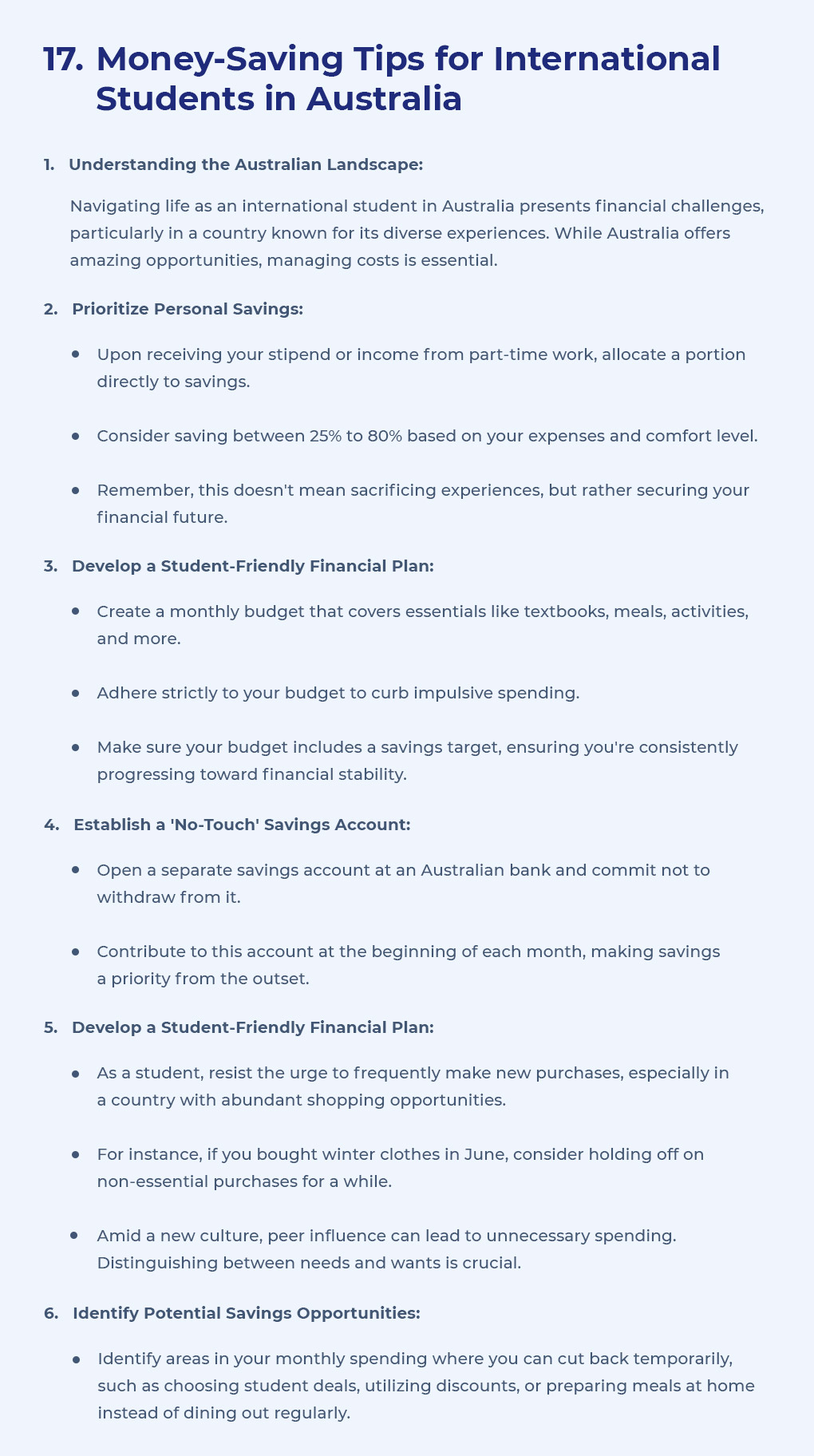

Australia, renowned for its world-class education and diverse cultural experiences, continues to be a favoured destination for international students seeking academic excellence. This article delves into the standard of living that international students can anticipate in Australia, providing comprehensive insights into various facets that shape their daily lives. From educational expenses to living costs, this comprehensive guide offers a clear understanding of the life of an international student studying and residing in Australia.
In this blog we will cover the following 17 topics:
Australia, renowned for its world-class education and diverse academic offerings, offers an enriching learning environment. The country hosts a variety of esteemed institutions that provide high-quality education. Tuition fees in Australia vary based on the university, program, and level of study.
For undergraduate degrees in Australia, tuition fees can range from AUD 20,000 to AUD 45,000 per year for international students. The fees vary depending on the field of study, university ranking, and location. Students pursuing programs in fields like business, engineering, computer science, and social sciences may encounter different fee structures.
Postgraduate tuition fees in Australia are also influenced by factors such as program type, university reputation, and duration of study. On average, international students can expect to pay around AUD 22,000 to AUD 50,000 per year for postgraduate courses. Programs in fields like business, IT, engineering, and social sciences may have varying fee ranges.
Australia offers a range of affordable yet reputable universities for international students. Some examples of universities with reasonable tuition fees include:
Fee Considerations:
It's important to note that tuition fees can vary widely between universities and across different study programs. Additionally, living expenses such as accommodation, food, transportation, and health insurance should also be factored into your overall budget when planning to study in Australia.

Accommodation is a significant aspect of the cost of living for international students in Australia. Various types of housing options are available, each with its associated costs and advantages.
On-campus accommodation, such as university dormitories or student residences, is a popular choice for many international students. These accommodations are typically situated within or near the university campus, offering convenient access to classes and campus facilities.
Cost: The cost of on-campus accommodation can vary based on factors like the university's location, room size, and amenities provided. On average, students might expect to pay around AUD 150 to AUD 400 per week. En-suite rooms or apartments with additional amenities tend to have higher costs.
Private rental accommodation involves leasing apartments, flats, or houses from private landlords. This option offers more independence and the opportunity to experience life off-campus.
Cost: The cost of private accommodation varies greatly depending on the location, property type, and city. In major cities like Sydney or Melbourne, one-bedroom apartments might range from AUD 1,000 to AUD 2,500 per month. Costs can be lower in smaller towns.
Opting for a homestay means living with a local host family. This choice provides a unique cultural immersion experience and the chance to engage in the daily life of an Australian family.
Cost: The cost of homestays can vary based on location, meal inclusions, and comfort level. On average, students might anticipate paying around AUD 200 to AUD 350 per week.
Many international students also choose to share rental accommodations with roommates. This approach can help reduce individual living expenses.
Cost: The cost of shared accommodation varies based on location and the number of roommates. Shared housing can range from AUD 100 to AUD 300 per week per person, depending on the city.
For students arriving in Australia, temporary housing options like hostels, guesthouses, or short-term apartment rentals are available. These serve as interim accommodations until students secure a more permanent residence.
Cost: Temporary accommodations' costs vary widely based on location and comfort level. Hostels, for example, can range from AUD 20 to AUD 60 per night.

When considering the cost of living in Australia, managing your budget for food and groceries is a vital aspect for international students. Australia offers a diverse culinary landscape, from home-cooked meals to exploring local eateries. Let's delve into the details of food expenses and strategies to effectively budget for your meals.
Preparing your meals at home can be a cost-efficient approach, enabling you to have control over your spending and dietary preferences. Here's a breakdown of what you can anticipate:
While cooking at home offers savings, treating yourself to dining out occasionally is a delightful experience. Here's what you can expect when opting to eat out:
Cafes and Fast Food: Affordable options such as cafes and fast-food chains offer quick and budget-friendly meals. A meal at a fast-food restaurant might cost around AUD 5 to AUD 15.
Restaurants: Dining at mid-range restaurants or local eateries offers a more elevated experience, albeit with slightly higher costs. Meals at such establishments could range from AUD 20 to AUD 50 per person, excluding beverages.

Getting around in Australia is a crucial consideration for international students, and the country offers a variety of transportation modes to suit different needs.
Australia's cities have efficient public transportation networks that include buses, trains, trams, and ferries. Here's an overview of what you need to know:
Opal Card (Sydney) and Myki Card (Melbourne): In major cities like Sydney and Melbourne, smart cards such as the Opal Card and Myki Card offer convenient access to public transportation. These cards provide discounted fares compared to buying individual tickets and can be used across various modes of transport.
• Public Buses and Trains: Public buses and trains are widely available in most cities and offer an affordable way to travel within the city and its suburbs. Many cities also offer discounted transportation passes for students.
• Trams: Cities like Melbourne have iconic tram networks that provide a unique mode of transport within the urban area.
• Ferries: In cities with water bodies, such as Sydney, ferries provide scenic transportation options across the harbour.
Cost: Public transportation costs vary based on factors like location, frequency of use, and whether you have a student concession card. On average, you might budget around AUD 50 to AUD 120 per month for public transportation.
Cycling is gaining popularity as an eco-friendly mode of transportation in Australia's cities. Dedicated bike lanes and bike-sharing programs make cycling a convenient option.
Cost: If you already own a bicycle, cycling can be a cost-effective way to get around. Bike-sharing services might cost around AUD 2 to AUD 5 per ride.
Balancing academics with leisure activities is vital for a fulfilling student experience. Australia offers a diverse range of entertainment options to help you unwind and explore the local culture.
Australia boasts a rich cultural heritage and offers various museums, galleries, and historical sites for exploration. Many of these attractions offer discounted or free entry for students.
Cost: Entry fees vary based on the attraction, with some museums and galleries offering free admission, while others might charge around AUD 10 to AUD 25 for students.
Major cities like Sydney and Melbourne have vibrant performing arts scenes, offering theatre productions, musicals, ballets, and concerts.
Cost: Ticket prices vary depending on the production, venue, and seating. Student discounts are often available for performances.
Australia's cities offer a dynamic nightlife with live music venues, pubs, and nightclubs hosting a variety of events and performances.
Cost: Ticket prices for live music events can vary widely, with some venues offering discounted entry for students.
Australia's natural landscapes provide ample opportunities for outdoor activities such as hiking, beach outings, and picnics.
Cost: Many outdoor activities are free or have minimal costs, making them an affordable way to enjoy the outdoors.
Most Australian universities offer a range of student clubs and societies catering to diverse interests, from sports and hobbies to cultural and academic pursuits.
Cost: Membership fees for student clubs and societies are generally reasonable and offer access to social events and group activities.
Staying connected is crucial for academic and social interactions. Australia offers reliable internet and mobile connectivity options.
i. Mobile Connectivity
Australia's primary network operators include Telstra, Optus, and Vodafone. These providers offer various mobile plans with different data allowances and features.
Cost: Basic prepaid plans start from around AUD 10 to AUD 30 per month, while contract plans might start from AUD 20 to AUD 50 per month, depending on data and calling features.
ii. Internet Connectivity
Australia offers a range of internet plans, including ADSL and NBN (National Broadband Network) options, with different speeds to suit your needs.
Cost: Standard broadband packages can range from AUD 50 to AUD 100 per month, while higher-speed NBN plans might range from AUD 70 to AUD 120 per month. Many providers also bundle internet with TV and phone services for discounted rates.

Balancing your studies with part-time work can be a valuable strategy to manage your expenses and enhance your work experience while pursuing education in Australia. Here's a comprehensive guide to understanding the part-time work opportunities available to international students.
Australian universities offer on-campus job opportunities for international students, enabling them to balance work and studies effectively. These positions are designed to accommodate your academic schedule.
Types of On-Campus Jobs:
Work Hours: On-campus jobs typically offer up to 20 hours of work per week during study periods and full-time during breaks.
Advantages:
International students with a valid student visa in Australia are also eligible to work off-campus, gaining broader work exposure and contributing to the local job market.
Types of Off-Campus Jobs:
Work Hours: Similar to on-campus jobs, off-campus employment allows up to 20 hours of work per week during study periods and full-time during breaks.
Advantages:
When considering part-time work, international students should be aware of these regulations:
• Work Hours:Work Hours: While studying, you're permitted to work up to 20 hours per week during study periods and full-time during breaks.
• Minimum Wage: Australia enforces a minimum wage, and employers are required to adhere to it. Make sure to research the current minimum wage rates.
• Tax File Number (TFN): To work legally in Australia, you'll need a Tax File Number (TFN). You can apply for one upon arrival.
Striking a balance between work commitments and academic responsibilities is crucial:

Australia's "Temporary Graduate Visa" offers international students the chance to remain and work in the country after completing their studies, promoting career growth and building a professional network. Here's a comprehensive guide to understanding the post-study work rights available to international students in Australia.
Eligibility Criteria for Post-Study Work Opportunities in Australia:
Extended Visa Duration: The Temporary Graduate Visa extends your stay in Australia after your studies. Formerly, graduates were allowed to stay for up to 2 years, but under the new rules, international students can extend their stay for up to 4 years. This provides a significant advantage, especially for those in science, technology, engineering, and mathematics (STEM) fields.
Application Process:
To apply for the Temporary Graduate Visa:
Charges: The application fee for the Temporary Graduate Visa varies depending on the type of visa and processing time. As of the latest data, the cost is approximately AUD 1,650 for the two-year visa and AUD 2,450 for the four-year visa. Additionally, you may need to pay the Immigration Health Surcharge for healthcare coverage.
Advantages:
Understanding the exchange rate and its impact on daily expenses is crucial for international students planning to study in Australia.
Converting your home currency to Australian Dollars (AUD) and estimating living costs is an essential step in budgeting for your academic journey.
Various financial institutions and currency exchange services may apply different rates, so it's important to be aware of the potential variations when planning your finances for your time in Australia.
To assist prospective students in making informed decisions about their budget, it's important to explore both the more affordable and relatively expensive cities in Australia. By doing so, you can gain a comprehensive understanding of potential living costs based on your preferred study destination.
Here are some examples of affordable and costlier cities for international students in Australia:

The latest economic data from Australia sheds light on the nation's average income landscape. According to the most recent available statistics, the average weekly full-time earnings for all employees in Australia stand at approximately AUD $1,750 before taxes. This equates to an estimated annual salary of around AUD $91,000, signifying a 2.4% increase from the previous year. These figures highlight the evolving income dynamics within the country's workforce.
However, it's important to recognize that these figures provide a general overview and that individual salaries can vary significantly. Factors such as age, geographic location, industry, occupation, and employment sector play substantial roles in determining earning potentials.
Interestingly, executive compensation also holds a prominent place in the Australian economic landscape. The Australian Council of Superannuation Investors (ACSI) reported that the median realized pay for ASX100 CEOs in 2022 reached approximately AUD $4.36 million, with variations dependent on industry and company performance.
For a more comprehensive understanding of income distribution across diverse occupations and industries, the Australian Bureau of Statistics (ABS) periodically releases the Employee Earnings and Hours (EEH) survey. This comprehensive survey provides detailed insights into earnings across various demographic groups and helps shed light on the economic contours of the nation's labour force.

Ensuring access to quality health care is a crucial aspect for international students pursuing education in Australia. The country maintains a well-established health care system, and comprehending health care options and insurance prerequisites is essential for maintaining your well-being and financial security during your studies.
Australia boasts a public health care scheme known as Medicare, designed to provide medical services, treatments, and hospital care to eligible residents, including international students from certain countries.
Eligibility: International students from countries with a reciprocal health care agreement may be eligible for Medicare benefits. It's advisable to check the specific eligibility criteria based on your home country.
While Medicare covers essential health services, many international students opt for additional coverage through Overseas Student Health Cover (OSHC). OSHC provides extended health care benefits, ensuring peace of mind and comprehensive medical coverage.
Advantages:
Cost: The cost of OSHC varies based on the insurance provider and the level of coverage selected. It's advisable to compare different OSHC plans to find the one that aligns with your requirements.
Prescription medications may incur a fee even under OSHC coverage. The cost varies depending on the medication and other factors.
Cost: As of the most recent data, prescription costs with OSHC coverage range from AUD $6.60 to AUD $41.30 per prescription item.
Registering with a local General Practitioner (GP) is recommended to access primary health care services. GPs provide non-emergency medical care and referrals to specialists if necessary.
Advantages:
In case of emergencies, international students can seek medical attention at hospital Emergency Departments. Emergency care is accessible to all, and international students can access treatment even without private health insurance.
For more information read our blog “Medical and Health care facilities for International Students in Australia”

Studying in Australia not only offers top-tier education but also provides a vibrant cultural and social experience. Engaging in cultural activities, participating in social events, and immersing yourself in the local community can enhance your student life. Here's a comprehensive guide to managing your cultural and social expenses while making the most of your time in Australia.
Australia is renowned for its diverse and inclusive society. Embracing this multicultural environment can lead to personal growth and expanded perspectives.
Cost: Engaging with different cultures and communities is often free or involves minimal expenses for attending events or activities.
Australian universities offer an array of student clubs and societies catering to various interests. Joining these groups offers an opportunity to connect with peers who share your passions.
Cost: Membership fees for student clubs and societies vary, but they are generally affordable. These fees cover the organization of events, activities, and workshops.
Australia hosts a plethora of events, festivals, and celebrations throughout the year. Participating in these cultural gatherings provides insight into local traditions and customs.
Cost: Entry to many local events and festivals is either free or requires a nominal fee. Certain events may have higher ticket prices, particularly for international or large-scale festivals.
Australia boasts outstanding museums and galleries that provide insights into art, history, and culture. Many institutions offer discounted or free entry for students.
Cost: Entry fees for museums and galleries can vary. Some institutions offer free entry, while others may charge around AUD $10 to AUD $20 for students.
Socializing with friends and fellow students often involves dining out or meeting at cafes. Exploring local cuisine and trying different restaurants can be a delightful experience.
Cost: The cost of socializing and dining out varies depending on the venue and your preferences. Budget around AUD $15 to AUD $30 for a casual meal or outing.
Please note that cultural and social activities may vary based on location and availability. Stay updated with local events and opportunities to make the most of your experience in Australia.

As an international student pursuing education in Australia, you'll immerse yourself in a dynamic academic environment that fosters intellectual growth, independent thinking, and research excellence. This section delves into the teaching styles and research opportunities that contribute to the enriching academic experience offered by Australian universities.
Australian universities are renowned for emphasizing independent learning and critical thinking skills among students. These institutions prioritize developing well-rounded and intellectually curious individuals through their teaching styles.
Lectures are a cornerstone of Australia's higher education system. Professors use these sessions to present essential concepts, theories, and ideas related to course material. However, the focus isn't solely on passive learning. Students are encouraged to actively engage, ask questions, and seek clarification.
Seminars, conducted in smaller groups, facilitate in-depth discussions and analysis. Students actively participate, sharing perspectives and engaging in debates. Seminars allow for intimate exploration of complex subjects, fostering critical thinking.
Tutorials provide personalized learning experiences. In these sessions, students work closely with professors or tutors to delve into specific subjects, clarify doubts, and receive assignment feedback. Tutorials enable one-on-one or small-group interactions, allowing students to explore topics deeply.
Australian universities are globally recognized for their research contributions across diverse fields. International students have unique opportunities to engage in cutting-edge research projects, enhancing their academic and professional growth.
Many Australian universities prioritize research collaborations between students and faculty. International students actively participate in ongoing research initiatives, collaborating with experts and contributing to knowledge advancement.
Even at the undergraduate level, Australian universities encourage students to participate in research. Early exposure enables students to explore interests, develop research skills, and understand methodologies used in their chosen disciplines.
Australian universities provide well-equipped research facilities and extensive resources for diverse research areas. Access to state-of-the-art laboratories, libraries, and online databases empowers students to conduct comprehensive research.
Engaging in research enriches academic experiences and enhances employability. Research participation equips international students with problem-solving, analytical thinking, and a deep understanding of their fields – traits valued by future employers.

Australia's weather is characterized by its diversity due to its vast size and varied geographical features. Be prepared for a range of conditions and adapt your clothing and plans accordingly.
Australia's high UV levels require sun protection year-round. Apply sunscreen, seek shade, and wear protective clothing to avoid sunburn and skin damage.
Australia's summers can be intense, especially in inland areas. Stay hydrated, wear appropriate clothing, and avoid strenuous activities during the hottest parts of the day.

Navigating visa requirements and regulations is vital for international students planning to study in Australia. The Australian government offers comprehensive information on student visas, work permissions, and post-study opportunities to ensure a smooth experience during your educational journey.
For more information read our blog “ A comprehensive Guide to Student Visa for Australia: Types, Requirements, and Application Process”?>
Australia upholds a strong reputation for safety and security. Nevertheless, it's essential to remain vigilant about your surroundings and follow sensible safety measures to ensure a secure and comfortable stay.
To know more, read our Blog: "Safety and Security for International Students in the Australia"
Effectively managing your finances is paramount while studying in Australia. Opening a local bank account not only provides convenient access to your funds but also simplifies financial transactions such as paying tuition fees, rent, and day-to-day expenses.
Alongside traditional banks, Australia has embraced digital banking solutions like CommBank, ANZ, and NAB. These platforms offer user-friendly mobile apps, real-time transaction tracking, and innovative features tailored to modern banking needs.

Being an international student in Australia brings together academic achievement, cultural richness, and personal development. With strong support structures, numerous employment prospects, and a thriving social environment, Australia remains a premier destination for students seeking quality living standards alongside their educational pursuits.
Embrace this adventure, seize every opportunity, and allow Australia to leave an enduring imprint on both your academic journey and personal growth.

Studying abroad is an exciting and life-changing experience that offers students a chance to gain a global perspective and valuable exposure ...

In our rapidly globalizing world, where boundaries are melting away and opportunities abound, proficiency in the English language has become ...

Choosing to pursue higher education abroad is an exciting and life-changing decision. Among the plethora of options available to internationa...

Studying abroad is a life-altering adventure that opens doors to new cultures, experiences, and opportunities. Among the plethora of global s...

Australia is not just famous for its iconic Sydney Opera House, the Great Barrier Reef, and its unique wildlife; it is also recognized global...

Studying abroad is a life-changing decision, and with so many options available, it can be overwhelming to choose the right country and univers...

As of March 2022, Australia has seen a consistent rise in its international student numbers, with enrolments reaching 440,219. This marks an ...

In the coming, international students continue to be drawn to the United Kingdom for its world-class education and diverse cultural experiences...